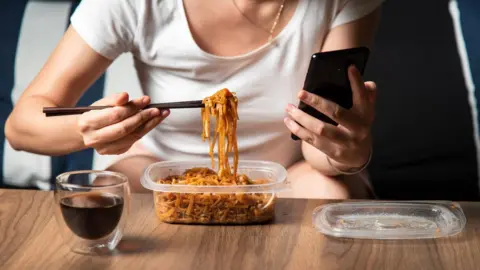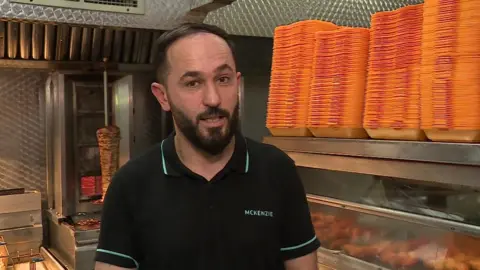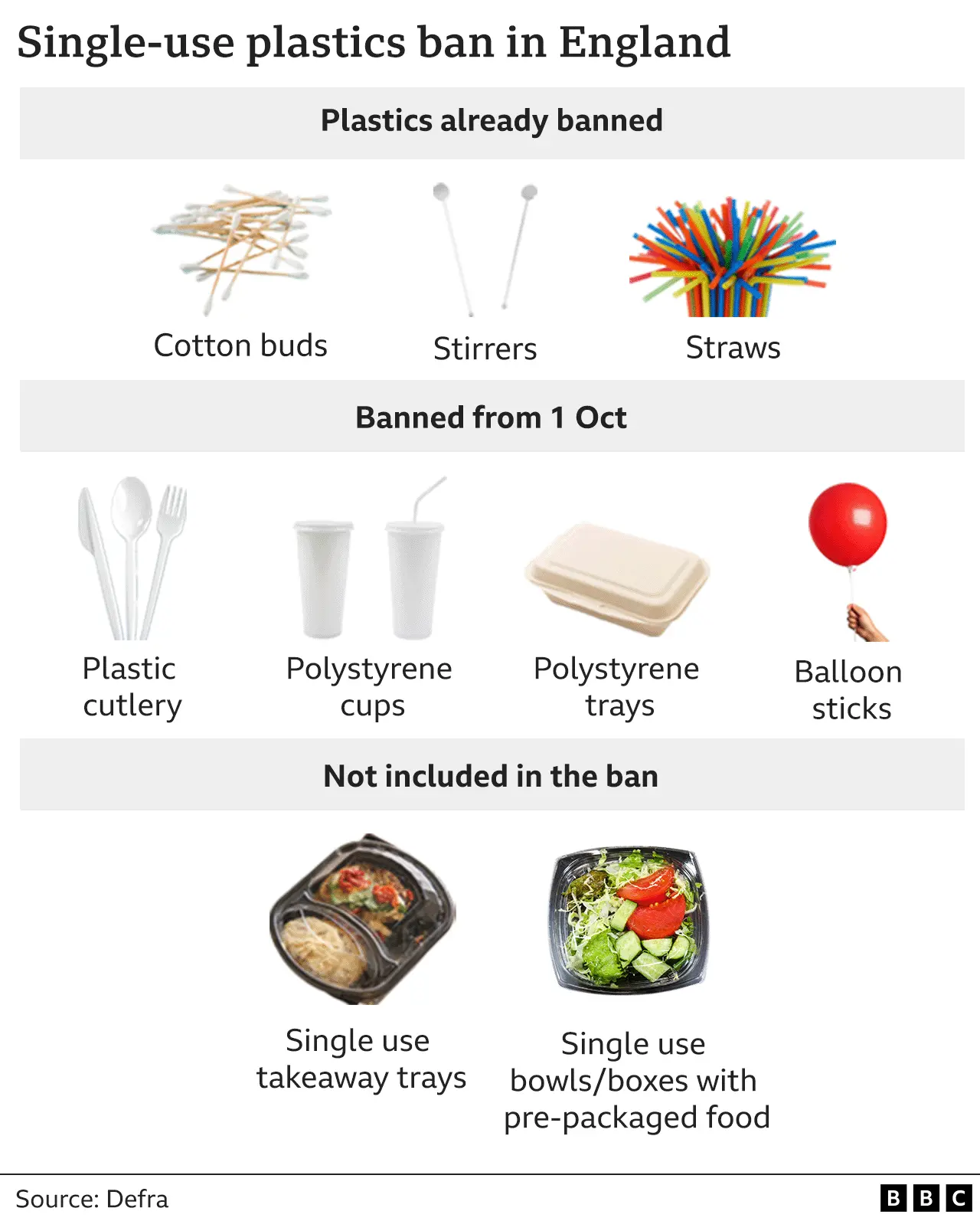Single-use plastic ban: Some firms unaware of England's new ban
 Getty Images
Getty ImagesFirms have told the BBC they were not aware of a ban in England on single-use plastic cutlery, plates and polystyrene trays that comes into force on Sunday.
The ban does not extend to plastic containers and trays used in takeaways or for pre-packaged food in shops.
Environmental campaigners said the new rules do not go far enough, and called the government's approach "piecemeal".
The government said it was the "next big step" in its "journey to eliminate all avoidable plastic waste by 2042".
Plastic pollution takes hundreds of years to break down, harms waterways and is a source of greenhouse gases.
From Sunday, 1 October, shops, takeaways, food vendors and other hospitality businesses will no longer be able to sell single-use plastic cutlery, balloon sticks, polystyrene cups or food containers.
It follows a similar ban in 2022 on single-use straws, stirrers and cotton buds containing plastic.
However, under an exemption to the new rules, takeaways will still be able to use plastic containers, trays and wrap.
Retailers can also continue using plastic plates, bowls and trays for pre-packaged food such as pre-filled salad bowls and ready meals.
The government said these items were classed as "packaging" and would be tackled under separate rules. These are meant to shift the costs of dealing with packaging waste away from local authorities and onto packaging producers.
Anna Diski, plastics campaigner for Greenpeace UK, said: "Legislating token bans on a few single-use plastic items every few years... [is] completely inadequate to the scale of the problem.
"Instead of this piecemeal approach, the government needs to address the problem at source and roll out a serious strategy to cut how much plastic is being produced."
Meanwhile, some businesses said they were not aware of the new rules at all.
Takeaway owner Herdy Ibrahim in Leeds told the BBC: "To be honest with you I haven't heard anything about it."

Across the road at Fast Fried Chicken, Jalal Ali said he had just bought two weeks' supply of polystyrene boxes and wholesalers are "still full" of packaging that will be banned from Sunday.
"I've been to the warehouse yesterday and they still have plastic forks and polystyrene trays like I have here," he said.
Andrew Crook, president of the National Federation of Fish Friers (NFFF), told the BBC's Today programme: "We've been working with the Foodservice Packaging Association and Defra to get information together for our members but, of course, not all takeaways and restaurants are members of organisations so there will be places out there that will be learning the news today."
In September, the British Independent Retail Association, that works with more than 6,000 independent businesses, warned some firms were unaware of, or unprepared for, the new rules.
Businesses that continue to supply banned single-use plastics after 1 October could be fined and local authorities will be carrying out inspections.
Environment Minister Rebecca Pow said the government had worked closely with industry over the last nine months to help it transition to greener packaging.
"This new ban will protect the environment and help to cut litter - stopping plastic pollution dirtying our streets and threatening our wildlife," she said.
'Special conditions'
There is backing by the public to reduce plastic waste. According to research by takeaway delivery platform Just Eat, 70% of people think the government should do more to reduce plastic use, while 73% would support a ban on plastic takeaway boxes.
Robin Clark, global director of sustainability at Just Eat, said that the UK takeaway industry used around 500 million single-use plastic boxes each year.
The firm urged the government to make sustainable packaging alternatives more widely available and affordable for businesses and consumers.

Mr Crook from the NFFF added that consumers needed to be educated about how to dispose of newer compostable packaging that is being sold as biodegradable.
"They need special conditions," he said. "So it is not every composting facility that can handle them.
"I think that consumers will just put them in general waste, which means that without another bit of work done by government it is going to be a bit of a futile exercise."
David Mahoney, chief operations officer at Impact Recycling in Newcastle upon Tyne, told BBC Breakfast that while most plastic products can be recycled, it is difficult to do so with polystyrene.
He said that the plastic processed at its plant is turned into products such as water bottles, tote bags, baskets, watering cans, garden furniture.
But he said: "Inevitably there are some things that we have to send to landfill and some of the polystyrenes are those items because it is just inefficient to actually recycle. You cannot get them in a quantity [and] a condition where they can be recycled."
